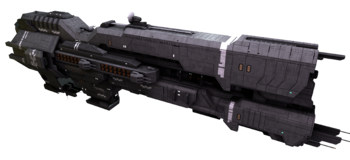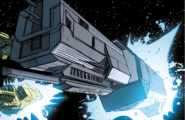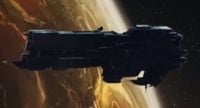Hillsborough-class heavy destroyer: Difference between revisions
From Halopedia, the Halo wiki
BaconShelf (talk | contribs) mNo edit summary |
|||
| Line 78: | Line 78: | ||
*''[[Halo: Contact Harvest]]'' {{Mo}} | *''[[Halo: Contact Harvest]]'' {{Mo}} | ||
*''[[Halo Wars: Genesis]]'' {{1st}} | *''[[Halo Wars: Genesis]]'' {{1st}} | ||
*''[[Halo: Evolutions | *''[[Halo: Evolutions]]'' | ||
**''[[The Impossible Life and the Possible Death of Preston J. Cole]]'' {{Mo}} | **''[[The Impossible Life and the Possible Death of Preston J. Cole]]'' {{Mo}} | ||
*''[[Halo: Fall of Reach]]'' | *''[[Halo: Fall of Reach]]'' | ||
Revision as of 11:56, November 9, 2022
| Hillsborough-class | |||||||||||||||||||
|---|---|---|---|---|---|---|---|---|---|---|---|---|---|---|---|---|---|---|---|

| |||||||||||||||||||
| Class attributes | |||||||||||||||||||
|
Operators: |
|||||||||||||||||||
|
Manufacturer: |
|||||||||||||||||||
|
In service: |
|||||||||||||||||||
| |||||||||||||||||||
The Hillsborough-class heavy destroyer is a class of destroyer originally in service with the Colonial Military Authority and then the UNSC Navy.[3]
Overview
Design details
The Hillsborough-class heavy destroyer bears a blocky and angular silhouette - something that would become one of the defining symbols of the Colonial Military Authority at their height.[2] The ship has an overall structure similar to the standard line of frigates that would later be introduced by SinoViet Heavy Machinery beginning with the Stalwart-class light frigate in 2515 and continued with the Charon-class and Paris-class iin 2520 and 2523 respectively, with two major hulls extremely similar in appearance to the Paris-class in particular. Unlike the frigates, the Hillsborough does not split up the hull booms, but instead has them connected to form one large blocky structure, coated in two metres of Titanium-A battle plate.[4] The Hillsborough also lacks the "wings" characteristic of the frigate lines, and has a less extreme horizontal profile as a result.
However, the Hillsborough does outmass all Insurrection-era frigate and destroyer classes with the exception of the older Diligence-class light destroyer, coming in at 2 million tonnes, and out-measures all known non-capital warships at a length of 526.0 meters (1,725.7 ft).[2]
Armaments
At the time of its introduction in 2499, the Hillsborough outclassed many of its counterparts in the UNSC Navy. For example, the UNSC's heavy destroyer class boasted a very limited Magnetic Accelerator Cannon system capable of only stocking three MAC rounds,[5] while the Hillsborough was built around an 83B6R1 MAC of its own. This weapon is supported by a loadout of four M60 Sentry autocannons and fifty-six M48 Ares missiles. For point-defence, the Hillsborough boasts seven M870 Rampart point defense guns.[2]
Ships of the line
- CMA Hillsborough – The lead ship of the class[6]
- CMA Heracles – Participated in the First Battle of Harvest[1]
Operational history
Hillsborough-class destroyers were originally introduced into CMA Navy service in 2499, at the height of the Insurrection. The angular silhouette of the class was one of the defining symbols of the CMA during its tenure, and was able to outmatch its United Nations Space Command counterparts for decades. Despite this, it was radically outmatched by its counterparts in the Covenant fleet during the Human-Covenant War.[2]
On October 7, 2525,[7] a Hillsborough-class destroyer of Battle Group 4, CMA Heracles, was dispatched to the Epsilon Indi system to investigate the loss of communications with the planet Harvest, alongside Arabia and Vostok. Upon exiting slipstream space in the system, the three ships were attacked by a Covenant vessel. Only the Heracles survived, albeit heavily damaged, by limping back to Reach.[8][1][9][4]
The outbreak of war saw all CMA forces placed under UNSC control for the "duration of the crisis",[10] leading to the CMA's fleet of Hillsborough-class vessels being transferred into UNSC control. Over the next few years, these ships were used for internal security, or were broken up for scrap.[2] By 2547, the CMA and all of its assets - including its fleet of Hillsborough-class destroyers - were all but effectively absorbed by the UNSC.[11]
Gallery
- UNSC Heracles.png
Another view of Heracles arriving at Epsilon Eridani, in Halo Wars: Genesis.
The Heracles transitions from slipspace at Epsilon Eridani in Halo: Fall of Reach - Boot Camp.
The Heracles and Battle Group 4 orbit a glassed Harvest, shortly before the fleet's near-destruction.
An unused render of the Hillsborough model created for Sins of the Prophets sent to 343 for inclusion in the Halo Encyclopedia (2022 edition).
List of appearances
- Halo: The Fall of Reach (First mentioned)
- Halo: Contact Harvest (Mentioned only)
- Halo Wars: Genesis (First appearance)
- Halo: Evolutions
- The Impossible Life and the Possible Death of Preston J. Cole (Mentioned only)
- Halo: Fall of Reach
- Halo: The Fall of Reach - The Animated Series
- Halo: Silent Storm (Mentioned only)
Sources
- ^ a b c Halo: The Fall of Reach, chapter 11
- ^ a b c d e f g h i j k l m n o Halo Encyclopedia (2022 edition), page 125
- ^ a b Halo Waypoint, Canon Fodder - Have S'moa (Retrieved on Jul 9, 2021) [archive]
- ^ a b c Halo Wars: Genesis, page 3
- ^ Halo: Evolutions - The Impossible Life and Possible Death of Preston J. Cole
- ^ Stephen Loftus on the Autumn class' talk page
- ^ Halo Wars, Timeline Events: 7 October, 2525
- ^ Official Halo Wars Community Site, Timeline (Retrieved on Dec 21, 2017) [local archive] [external archive]
- ^ Halo: Fall of Reach - Boot Camp, issue 4
- ^ Halo Wars, Timeline Events: 1 November, 2525
- ^ Halo Encyclopedia (2022 edition), page 52
| ||||||||||||||||||||||||||||||||||||||||||||||||||||||||





